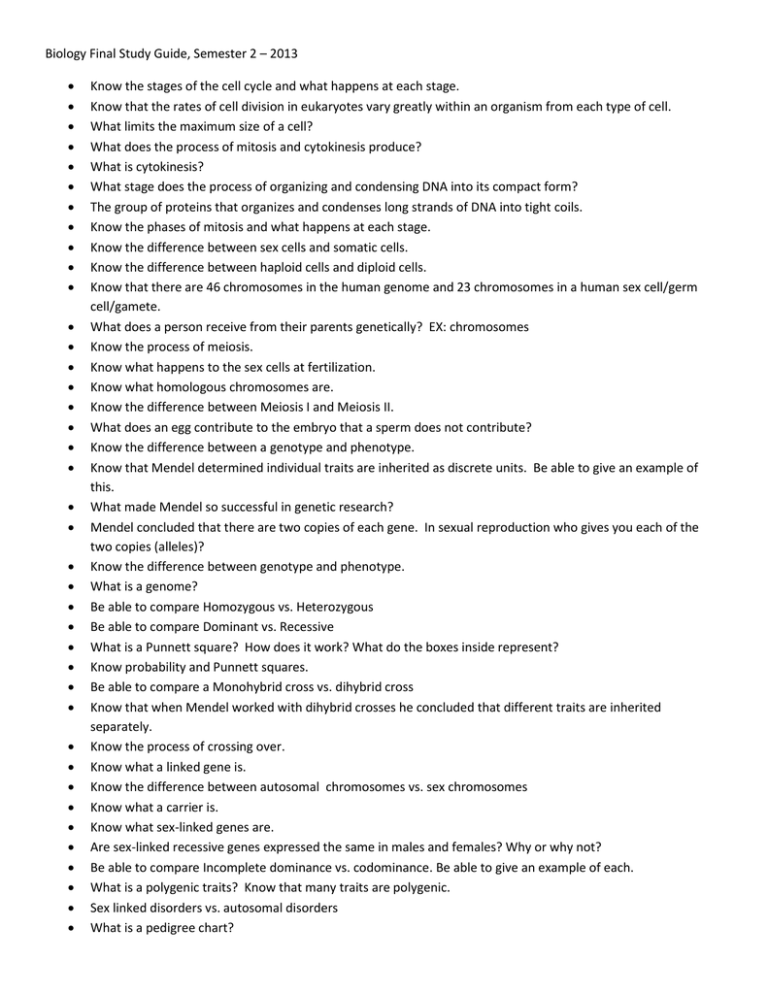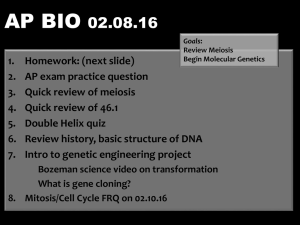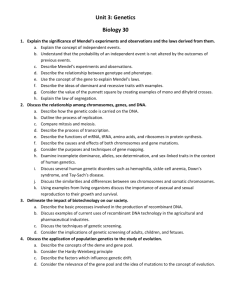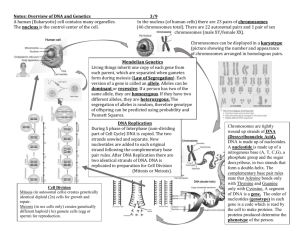Biology Final Study Guide Semester 2
advertisement

Biology Final Study Guide, Semester 2 – 2013 Know the stages of the cell cycle and what happens at each stage. Know that the rates of cell division in eukaryotes vary greatly within an organism from each type of cell. What limits the maximum size of a cell? What does the process of mitosis and cytokinesis produce? What is cytokinesis? What stage does the process of organizing and condensing DNA into its compact form? The group of proteins that organizes and condenses long strands of DNA into tight coils. Know the phases of mitosis and what happens at each stage. Know the difference between sex cells and somatic cells. Know the difference between haploid cells and diploid cells. Know that there are 46 chromosomes in the human genome and 23 chromosomes in a human sex cell/germ cell/gamete. What does a person receive from their parents genetically? EX: chromosomes Know the process of meiosis. Know what happens to the sex cells at fertilization. Know what homologous chromosomes are. Know the difference between Meiosis I and Meiosis II. What does an egg contribute to the embryo that a sperm does not contribute? Know the difference between a genotype and phenotype. Know that Mendel determined individual traits are inherited as discrete units. Be able to give an example of this. What made Mendel so successful in genetic research? Mendel concluded that there are two copies of each gene. In sexual reproduction who gives you each of the two copies (alleles)? Know the difference between genotype and phenotype. What is a genome? Be able to compare Homozygous vs. Heterozygous Be able to compare Dominant vs. Recessive What is a Punnett square? How does it work? What do the boxes inside represent? Know probability and Punnett squares. Be able to compare a Monohybrid cross vs. dihybrid cross Know that when Mendel worked with dihybrid crosses he concluded that different traits are inherited separately. Know the process of crossing over. Know what a linked gene is. Know the difference between autosomal chromosomes vs. sex chromosomes Know what a carrier is. Know what sex-linked genes are. Are sex-linked recessive genes expressed the same in males and females? Why or why not? Be able to compare Incomplete dominance vs. codominance. Be able to give an example of each. What is a polygenic traits? Know that many traits are polygenic. Sex linked disorders vs. autosomal disorders What is a pedigree chart? Know nucleotide base pairs. A, C, T, G (know they are named for the nitrogen-containing base) Which bases pair up? Know the complementary base sequences DNA to DNA or DNA to RNA What is a double helix? Who discovered the double helix? What holds base pairs together on the double helix? What kind of bond? Know the process of replication, transcription and translation. What do these processed create? How? Know the central dogma of molecular biology. What is the main function of DNA polymerase? What happens directly after a DNA molecule is unzipped? What does it mean when we say that DNA replication is semiconservative? When replicating DNA how are errors detected and fixed? What is the main function of tRNA? What happens after RNA polymerase recognizes the transcription start site of a gene? What is a codon? How many amino acids are used to make up all of the proteins in the human body? Where does translation occur? When do most mutations take place? Know the different kinds of mutations. Silent, Frameshift, Point mutation What are some examples of a mutagen (something that can cause a mutation to occur?) Know what a restriction enzyme is and how it is used. Know what sticky ends are. Know how/why gel electrophoresis is used. Know what a clone is and an example. Know these terms: recombinant DNA, genetic engineering, transgenic Know individual vs. population vs. community What is a species? Know the theories of uniformitarianism vs. catastrophism vs. gradualism What is evolution? Know adaptation vs. variation Know natural selection vs. artificial selection vs. descent with modification vs. fitness What is suggested by the similarity of early embryos of different species of vertebrates? Know gene pool, allele frequency, gene flow, hybridization, recombination, genetic drift, sexual selection, founder affect, bottleneck effect Know disruptive selection vs. stabilizing selection vs. directional selection What is the measure of how commonly a particular allele occurs in a population? (Answer: Allele Frequency) The normal shuffling of alleles during meiosis results in this…. Know intrasexual selection vs. intersexual selection Know speciation: temporal vs. behavioral vs. geographic




